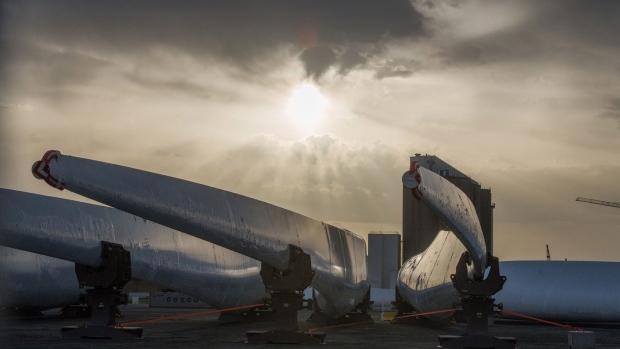Jan 20, 2023
Siemens Energy’s Troubles Mount on Wind Turbine Issues
, Bloomberg News

(Bloomberg) -- Siemens Energy AG’s efforts to finally return to profitability have been dealt yet another blow by its struggling Spanish wind turbine business with more product quality issues coming to light.
The German gas turbine and grid technology maker now expects a 2023 net loss at around last year’s level, Siemens Energy said late Thursday, which would take deficits over the past four years to about €3.7 billion ($4 billion). Checks at its Siemens Gamesa unit uncovered costly flaws in its turbines, offsetting improvements in other business areas. The German company recently moved to fully control Gamesa to finally make headway on fixing protracted problems.
A review of Gamesa’s existing wind turbines found a higher likelihood of faults than previously expected. The evaluation, part of new Chief Executive Officer’s Jochen Eickholt’s drive to get on top of a range of homegrown problems, showed components across the fleet with signs of wear. The issues will drive up service and warranty costs.
The faults were found in both onshore and offshore turbines, Eickholt said on a call with analysts. “We have now checked everything that we are aware of,” he said.
Gamesa said it recorded a preliminary loss of around €760 million before interest and taxes in the first quarter, driven by a €472 million hit after the checkups.
The company’s problems with existing and new turbines in development add to the industry’s turmoil in recent years, despite rising demand for wind power to meet global climate goals. Manufacturers including Vestas Wind Systems A/S have suffered steep losses as costs for key materials like steel soared and supply chain disruptions led to delays. The companies are now raising prices to make their balance sheets healthy enough to deliver on future growth.
Siemens Energy declined as much as 3.4% in Frankfurt, before recovering to trade around unchanged at 1:30 p.m. The stock is up about 6% since the start of the year.
“Today’s move in the share price suggest that the market fully expected more problems at Gamesa,” Berenberg analyst Phil Buller said, adding that Siemens Energy’ outlining expectations for positive pre-tax free cash flow for fiscal 2023 were positive.
Since Siemens Energy listed in 2020, former parent Siemens AG has planned to reduce its 35% stake in the company. It has delayed a sale due to the turbine maker’s subdued share price and Siemens Energy’s financing of the Gamesa takeover. “Last night’s news will not impact Siemens’ fine line,” Buller said. With Siemens Energy’s share price rising of late, Siemens is likely to start its selldown within the next 12 to 18 months, he said.
Operating Improvements
The issues at Gamesa more than offset improvements at Siemens Energy’s gas service, grid technology and industry transformation businesses, the company said. Earlier this month, it secured a €4 billion contract to help link offshore wind farms in the North Sea to Germany’s mainland power grid.
Siemens Energy now expects its margin before special items for the fiscal year ending Sept. 30 to come in at 1% to 3%. That’s down from a prior range of 2% to 4%. The company sees a 2023 net loss around last year’s level of €647 million.
Problems at the wind business have weighed on Siemens Energy before. Early last year, Siemens Gamesa replaced its CEO after a run of profit warnings, and mounting issues in the unit led Siemens Energy to lower its outlook in August.
--With assistance from William Mathis.
(Updates with analyst comment in eighth, ninth paragraphs)
©2023 Bloomberg L.P.






